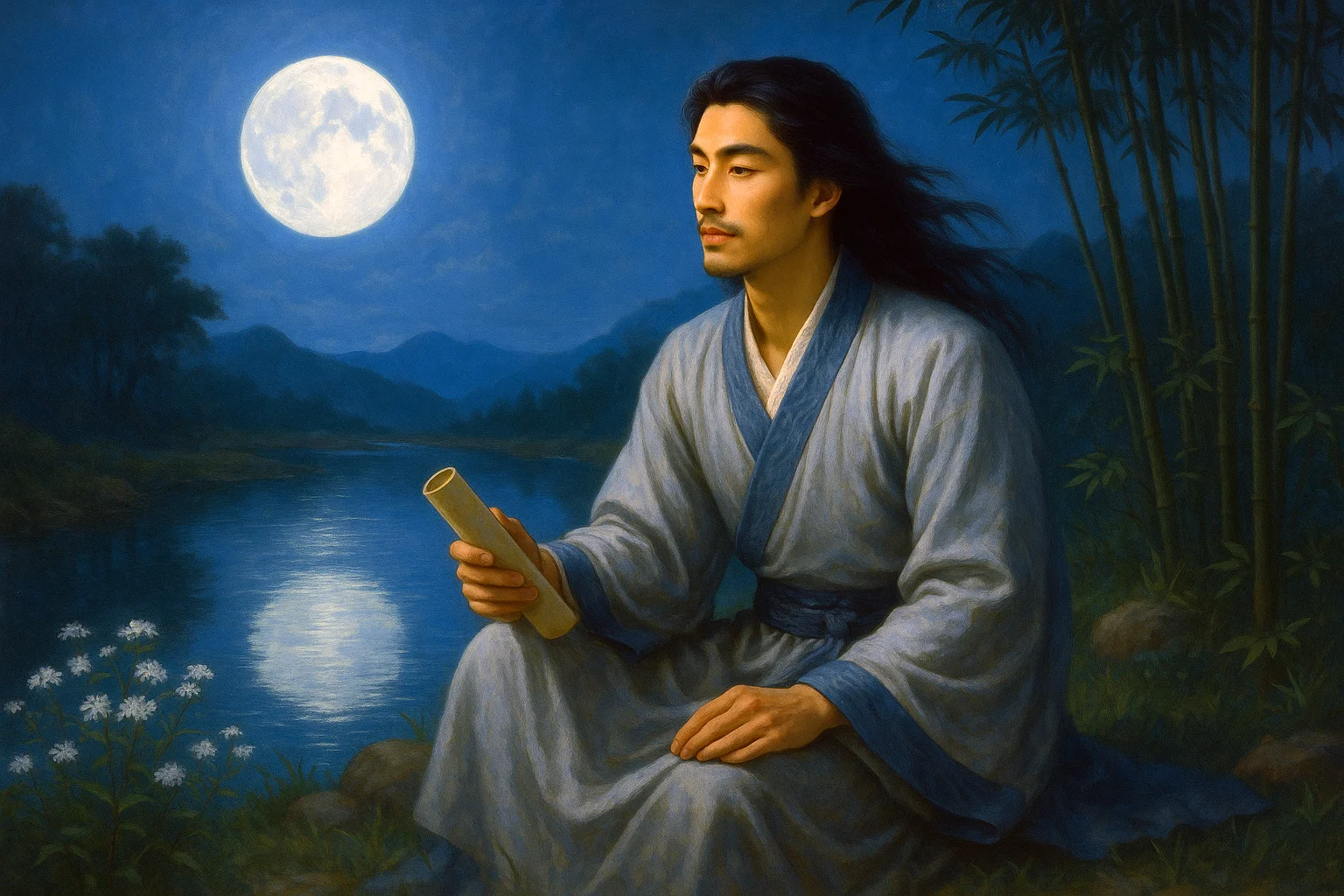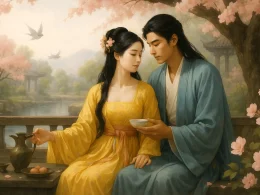At spill-over moment of pond and rain,
Scarlet shadows flurry—petals slain.
Spring's departure weighs my infinite sigh,
Exile's arithmetic: no way to multiply.
Original Poem
「城南二首 · 其二」
曾巩
水满横塘雨过时,一番红影杂花飞。
送春无限情惆怅,身在天涯未得归。
Interpretation
Composed in 1077 during Zeng Gong's service as prefect of Fuzhou, this companion piece to the first "South City" poem presents a dynamic counterpart to its predecessor's meditative stillness. Written in late spring, it captures the transient beauty of petals floating on rain-swollen ponds while voicing the poet's melancholic wanderlust. Where the first poem contemplated nature's enduring truths, this sequel articulates the human predicament of displacement—a hallmark of Zeng's ability to weave personal longing into philosophical landscapes.
First Couplet: "水满横塘雨过时,一番红影杂花飞。"
Shuǐ mǎn héng táng yǔ guò shí, yī fān hóng yǐng zá huā fēi.
The pond brims full where rains have passed away; / a blush of petal-shadows tints the spray.
The liquid imagery achieves triple resonance: "brims full" (水满) suggests emotional saturation, "rains have passed" marks temporal transition, while "petal-shadows" (红影) materialize memory's fleeting impressions. The flying petals' chromatic dance against water's mirror creates an ephemeral ballet of light and form.
Second Couplet: "送春无限情惆怅,身在天涯未得归。"
Sòng chūn wúxiàn qíng chóuchàng, shēn zài tiānyá wèi dé guī.
To bid spring farewell spins endless regret; / stranded at world's edge—no homeward track yet.
The couplet's emotional pivot turns on spatial paradox: "endless" (无限) sorrow confined within "world's edge" (天涯). The bureaucratic exile's predicament crystallizes in "no homeward track" (未得归)—a phrase whose five clipped syllables mimic frustrated footsteps. Spring's departure becomes allegory for life's irreversible passages and bureaucratic service's personal costs.
Holistic Appreciation
This poem vividly depicts the natural scenery of the southern suburbs after a spring rain with refreshing clarity, showcasing the poet's wisdom and broad-mindedness in contemplating life through nature. The opening couplet focuses on scenery, establishing a vast and lush natural atmosphere, while the second couplet shifts to lyrical expression, contrasting peach and plum blossoms with green grass to convey profound meaning. This creates a poetic structure that blends the tangible and intangible, movement and stillness.
Written in plain yet profound language, the poem embodies the poet's admiration for a life that is "pure yet unpretentious, tranquil yet resilient." It also reflects his steadfast character—upright, unyielding, and unswayed by superficial glamour.
Artistic Merits
- Scenery as Emotion, Subtle Expression
Rather than stating ideals directly, the poet embeds feelings within natural imagery, allowing emotion to emerge through the transformation of objects. - Philosophy Through Imagery, Unity of Nature and Self
The changing states of nature mirror life’s values and moral choices. The contrast between peach blossoms and green grass forms the core of the poem’s philosophical insight. - Fresh Style, Concise Language
The diction is simple and bright, free from ornate embellishments, yet rich in humanistic sentiment and life wisdom.
Insights
Through its depiction of late spring scenery and its underlying spiritual message, this poem inspires us to embrace a life of simplicity and resilience, like green grass, rather than chasing the fleeting glory of peach and plum blossoms. It reminds us that true value lies not in momentary brilliance but in enduring vitality nurtured in silence.
This celebration of life’s constancy and inner strength reflects the Confucian scholar’s ethos and the intellectual’s unwavering integrity. It also reveals the poet’s profound, dignified, and noble spirit—a world of thought that remains deeply resonant today.
About the Poet

Zeng Gong (曾巩, 1019 - 1083), a native of Nanfeng in Jiangxi province, stands among the illustrious "Eight Great Masters of Tang-Song Prose." His writings distinguished themselves through an elegant classical balance, celebrated for their rigorous argumentation and refined literary craftsmanship. While his poetry embraced an artless subtlety, his prose achieved what critics hailed as "the very essence of purity" - an achievement that, though perhaps less dazzling than his contemporaries like Su Shi or Wang Anshi, earned him posthumous reverence as the founding master of the "Nanfeng Literary School."












